
Transport in the United Kingdom is highly facilitated by road, rail, air and water networks. Transport is a devolved matter with each of the countries of the United Kingdom having separate systems under separate governments. A radial road network totals 29,145 miles (46,904 km) of main roads, 2,173 miles (3,497 km) of motorways and 213,750 miles (344,000 km) of paved roads.
A ferry is a boat that transports passengers, and occasionally vehicles and cargo, across a body of water. A small passenger ferry with multiple stops, like those in Venice, Italy, is sometimes referred to as a water taxi or water bus.

Devonport is a port city situated at the mouth of the Mersey River on the north-west coast of Tasmania, Australia. Positioned 47 kilometres (29 mi) east of Burnie and 98 kilometres (61 mi) north of Launceston, its harbour manages over half of Tasmania's imports and exports, standing as the busiest freight port on the island. Devonport also plays a pivotal role in Tasmania's trade sector, supporting industries such as agriculture, manufacturing, and tourism. The City of Devonport's gross domestic product (GDP) was estimated at $3.5b in 2023.

The Woolwich Ferry is a free vehicle and pedestrian ferry across the River Thames in East London, connecting Woolwich on the south bank with North Woolwich on the north. It is licensed and financed by London River Services, the maritime arm of Transport for London (TfL). Around two million passengers use the ferry each year.

Searoad Ferries is an Australian company that operates a roll-on/roll-off vehicle and passenger ferry service between the heads of Port Phillip, near Melbourne, Victoria, Australia.
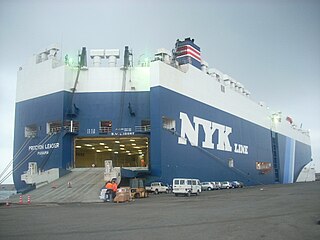
Roll-on/roll-off ships are cargo ships designed to carry wheeled cargo, such as cars, motorcycles, trucks, semi-trailer trucks, buses, trailers, and railroad cars, that are driven on and off the ship on their own wheels or using a platform vehicle, such as a self-propelled modular transporter. This is in contrast to lift-on/lift-off (LoLo) vessels, which use a crane to load and unload cargo.
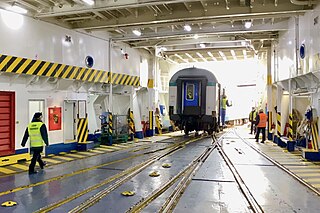
A train ferry is a ship (ferry) designed to carry railway vehicles. Typically, one level of the ship is fitted with railway tracks, and the vessel has a door at the front and/or rear to give access to the wharves. In the United States, train ferries are sometimes referred to as "car ferries", as distinguished from "auto ferries" used to transport automobiles. The wharf has a ramp, and a linkspan or "apron", balanced by weights, that connects the railway proper to the ship, allowing for tidal or seasonal changes in water level.

A passenger terminal is a structure in a port which services passengers boarding and leaving water vessels such as ferries, cruise ships and ocean liners. Depending on the types of vessels serviced by the terminal, it may be named ferry terminal, cruise terminal, marine terminal or maritime passenger terminal. As well as passengers, a passenger terminal sometimes has facilities for automobiles and other land vehicles to be picked up and dropped off by the water vessel.
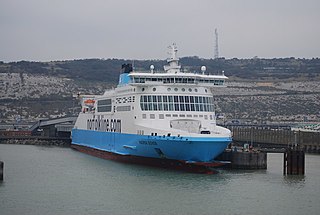
Norfolkline was a European ferry operator and logistics company owned by Maersk. It provided freight ferry services on the English Channel, Irish Sea, and the North Sea; and passenger ferry services on the English Channel and Irish Sea; and logistics services across Europe. Norfolkline employed more than 2,200 employees in 13 countries across Europe, operating out of 35 different locations.

HMAS Jervis Bay was a roll-on/roll-off passenger and vehicle ferry operated by the Royal Australian Navy (RAN) between 1977 and 1994.

The Little Creek-Cape Charles Ferry was a passenger ferry service operating across the mouth of the Chesapeake Bay from the 1930s until 1964. Known also as the Princess Anne-Kiptopeke Beach Ferry or Little Creek-Kiptopeke Beach Ferry, the service connected Virginia Beach, Virginia with Cape Charles on the Eastern Shore of Virginia. Departures from and arrivals to Cape Charles were matched with times of Pennsylvania Railroad passenger trains such as the Del-Mar-Va Express and the Cavalier that operated the length of the Delmarva Peninsula.

The MS al-Salam Boccaccio 98 was an Egyptian Ro/Ro passenger ferry, operated by El Salam Maritime Transport, that sank on 3 February 2006 in the Red Sea en route from Duba, Saudi Arabia, to Safaga in southern Egypt.
StraitNZ, formerly Strait Shipping and Bluebridge, is a New Zealand transport firm that operates roll-on/roll-off freight and passenger shipping across the Cook Strait, between Wellington in the North Island and Picton in the South Island, as well as trucking and logistics services across New Zealand.

GMV Aramoana was a roll-on/roll-off train ferry operating across Cook Strait between 1962 and 1983.

P&O Irish Sea was the trading name of P&O Ferries in the Irish Sea from 1998 to 2010, when it was rebranded P&O Ferries.

HSC INCAT 046 was a wave-piercing catamaran passenger-vehicle ferry. It operated under various marketing names, including Devil Cat, The Cat, The Lynx, and lastly The T&T Express.
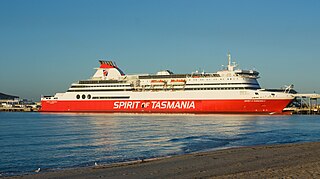
TT-Line Company Pty Ltd, trading as Spirit of Tasmania, is a Tasmanian Government-owned business that has been offering ferry services between mainland Australia and Tasmania since July 1993. Navigating the Bass Strait, Spirit of Tasmania ferry services cover a distance of 242 nautical miles between Geelong, Victoria and Devonport, Tasmania. Each journey across the "Sea Highway" takes approximately 9–11 hours in both directions.
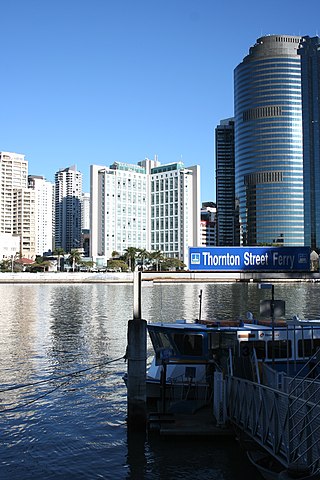
The article Ferry transport in Queensland provides both historical and current information relating to scheduled public passenger ferry services in Queensland. The first ferry started on 1 January 1843 at Russell Street with a service across the Brisbane River.

The MV Sorrento is a double-ended roll-on/roll-off vehicle ferry owned by Peninsula Searoad Transport of Victoria, Australia. It has operated between the heads of Port Phillip Bay between the towns of Queenscliff and Sorrento since 2000. It is the sister ship of Queenscliff, and on entering service enabled a doubling in the service frequency across the bay. The ferry can carry approximately 80 vehicles and 700 passengers. This ship is commonly referred to as “HMAS Mornpen”

The Atlantic Steam Navigation Company was founded in 1934 with the original object of providing a no-frills transatlantic passenger service. A combination of difficult economic conditions and then World War II frustrated these early ambitions.

















